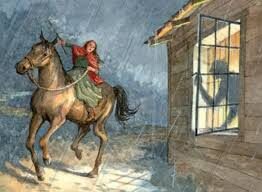 On April 26, 1777, 16-year-old Sybil Ludington rode 40-miles to muster troops for a Revolutionary War battle that some contest as a mythical account because it was not chronicled at the time. Instead, the story was passed down through oral traditions. Ludington remains celebrated only by those who know and believe in her story.
On April 26, 1777, 16-year-old Sybil Ludington rode 40-miles to muster troops for a Revolutionary War battle that some contest as a mythical account because it was not chronicled at the time. Instead, the story was passed down through oral traditions. Ludington remains celebrated only by those who know and believe in her story.
However, Paul Revere’s midnight ride two years earlier is famous because a poet, Longfellow, immortalized a fictionalized account of the ride. The truth is that Longfellow embellished liberally for the sake of the story, omitted many key facts, and romanticized a false account that Revere shouted “the British are coming!”
Why do we believe fictitious stories to be part of our history? Because we’re told they are facts? Because they make us feel good? Because they conjure up a sense of heroism we wish we had within us. Why isn’t the naked truth good enough? Do these fictional accounts merely serve to reinforce white male privilege? Here in The U.S. we are just beginning to discover our true history, stripped naked of the false narratives that glorify men. There is so much to learn. And unlearn.
Women’s accomplishments are quieter and usually not embellished. Their stories provide us with as much history as men in this country, though the women’s stories haven’t made it into the history books. Many women lived lives that quilted the United States of America together, though we don’t know their names, and their actions were often diverted into the dusty shadows of our history. Women surely were an integral part of the Constitution even before it was written on parchment, though their names aren’t mentioned.




Comment
There are currently no blog comments.